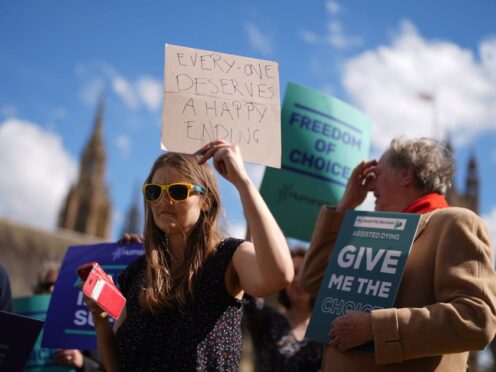
Campaigners on both sides of the assisted dying debate voiced their opinions as they gathered in Westminster while parliamentarians took part in a Westminster Hall debate across the road.
Monday’s three-hour debate took place after a petition, started by the Daily Express and backed by Dame Esther Rantzen, garnered more than 200,000 signatures.
Jenny Carruthers, 56, from Bath, attended the Dignity in Dying demonstration in the Old Palace Yard to call for a more humane law.
“My partner Gypie died in screaming agony. He had amazing palliative care but he had liver cancer spread to his bones,” she told the PA news agency, adding: “Now that my breast cancer has spread to my bones, I know where I’m headed.”
Ms Carruthers, who used to work for the NHS, said: “While we appreciate all the things that palliative teams do – and they’re absolutely incredible – there are people that they can’t reach and who can’t be helped.”
Ms Carruthers said she has children in their 20s who are very supportive of the campaign.
“They saw their stepfather suffering in that way and I just think I don’t want to leave them with that,” she said, adding: “I don’t want to be remembered that way.
“What would be nice is to make a calm decision with my family and be able to have them around me, and basically say goodnight. That isn’t what the law is allowing me to do.”
Jonathan Romain, 69, chairman of campaign group Dignity in Dying and rabbi at Maidenhead Synagogue, was critical of religion being used to dismiss the argument for assisted dying.
He told the PA news agency: “When we see somebody fall to the ground, thrashing around, we don’t say ‘oh, that’s God’s will’ and step over them. We rush to get a defibrillator.
“If we can intervene medically to save someone’s life, surely we can intervene to save someone from pain?
“For me, it’s not about shortening life, it’s about shortening death.”
Roger Symes, 66, from Surbiton, wore a Not Dead Yet T-shirt as he joined demonstrators who oppose assisted dying, some wearing white masks, doctors’ scrubs and blood-stained surgical gloves.

Mr Symes, who is the husband of Baroness Jane Campbell, told the PA news agency: “My wife is a severely disabled person, we’ve been blue-lighted into hospital many times, and every time the doctors do their best for her, make her well, and she’s out again. We don’t want to change that.”
Mr Symes said any change in the legislation would be a slippery slope.
“If it became law, you would get most doctors who don’t want anything to do with it, a subset of doctors will and they will then become the doctors you go to when you’re feeling suicidal,” he said, adding: “There will be pressure to widen the scope.”
Andy Greene, 49, from London, also attended the Not Dead Yet demonstration, which took place metres away from that of Dignity in Dying.
Mr Greene, who was born with no legs and one arm, told the PA news agency: “Disabled people have a big stake in this fight, but the debate is often aimed over their heads and goes on over their heads.
“We need to be able to be seen and heard in these spaces, because we have a hell of a lot to lose.”
Mr Greene, who is a member of Disabled People Against Cuts, sees the debate around assisted dying as a deflection from the discourse around government spending.
He said: “It is no counter measure or no mitigation against actually valuing people for their worth within society, giving them the right kind of services and support that allows people to have agency.”

Enjoy the convenience of having The Sunday Post delivered as a digital ePaper straight to your smartphone, tablet or computer.
Subscribe for only £5.49 a month and enjoy all the benefits of the printed paper as a digital replica.
Subscribe